Register
Lecture 16

The role of tourism and social/cultural capital in building resilience to disasters
Professor Sanjay Nepal Geography and Environmental Management Department, University of Waterloo
Professor Brent Doberstein Geography and Environmental Management Department, University of Waterloo
Dr. Erin O’Connell Lecturer and Associate Chair, Geography and Environmental Management Department, University of Waterloo
VIRTUAL SESSION 16 | June 20, 2024, THURSDAY 12 PM-1 PM EDT
Dr. Sanjay Nepal is a Professor in the Department of Geography and Environmental Management at the University of Waterloo. His research is focused on tourism, conservation, and communities.
Dr. Brent Doberstein is an Associate Professor in the Department of Geography and Environmental Management at the University of Waterloo and the past acting director of the Masters of Climate Change and Graduate Diploma in Climate Risk Management programs. He has been engaged in hazard, disaster, and climate change adaptation teaching and research in Canada and abroad for over twenty years.
Dr. Erin O’Connell is a Lecturer and Associate Chair of undergraduate studies in the Department of Geography and Environmental Management at the University of Waterloo. Her research focuses on hazard risk reduction and building more sustainable and resilient communities, with a particular focus on Southeast Asia.
Lecture 15
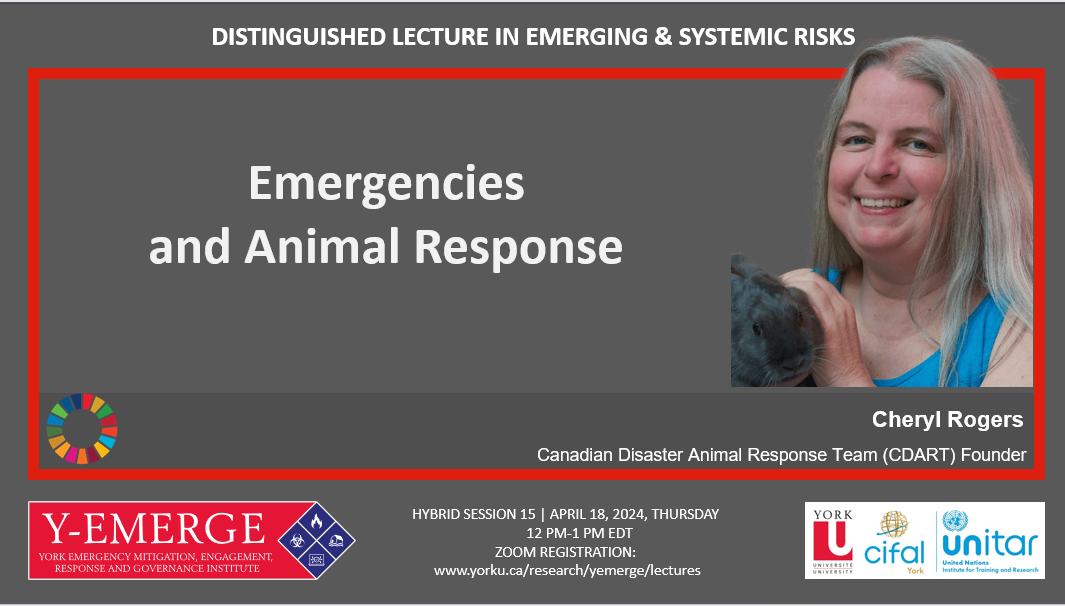
Emergencies and Animal Response
Cheryl Rogers
Canadian Disaster Animal Response Team (CDART) Founder
VIRTUAL SESSION 15 | APRIL 18 2024, THURSDAY 12 PM-1 PM EDT
Cheryl is a founder of CDART (Canadian Disaster Animal Response Team) and has deployed to Firestorm in 2003, Katrina in 2005 and Fort McMurray in 2016 as well as many smaller local emergencies. She is the CDART liaison with the BC government and represented CDART as part of the earthquake consultation with Henry Renteria.
The Canadian Disaster Animal Response Team (CDART) provides disaster response services for domesticated animals. They rescue, shelter and care for pets and livestock during disasters/emergencies when people are forced to evacuate and cannot care for their own animals.
CDART began in 2003 after the wildfires in Barriere, Kamloops and Kelowna. They deployed to those fires as Noah's Wish volunteers but decided they needed a group of specially-trained, dedicated volunteers from/for Canada.
Lecture 14

Intersecting injustices and competing narratives for climate change
Terry Cannon
Emeritus Research Fellow Institute of Development Studies at University of Sussex, UK Honorary Professor at University College London
HYBRID SESSION 14 | MARCH 21, 2024, THURSDAY 12 PM-1 PM EDT
Terry Cannon is a specialist in disaster risk reduction and adaptation to climate change, with particular expertise in rural livelihoods, community-based adaptation, and in vulnerability analysis for disaster risk reduction (DRR). He has pioneered the understanding of vulnerability analysis and social protection in the context of disasters as part of frameworks for risk reduction and adaptation to climate change. This has recently extended to assessment of the significance of culture as a factor in understanding people’s and organizations’ attitude to risk (relating to climate change and disasters). In 2014 he was lead editor of the IFRC World Disasters Report 2014 focus on culture and risk, has participated in a number of conferences and workshops to advocate for this ‘missing link’ in DRR. He is also part of a research group that is challenging the terminology of ‘community’ and ‘community-based’, which is used uncritically and not leading to helpful interventions.
He was leader of a DFID project to promote science for climate change in South Asia, with workshops in India and Nepal and support for young scientists to be published. Before that he was director of the DFID supported Strengthening Climate Resilience project at IDS that worked on the integration of climate change adaptation with disaster risk reduction and development. This included the emergence of new thinking on how specific forms of adaptation can emerge in the development context. He has also acted in an advisory consultancy to the IFRC Vulnerability and Capacity Assessment process in relation to climate change and urbanisation (2010-13) and its integration into community assessments of vulnerability. Participatory methods are being explored to assess how relevant these are to allocations of adaptation funding, including through social protection. A similar approach is being taken in research in Bangladesh and India, especially on diversification of rural livelihoods and potential for cyclone disaster preparedness. He also supports the International Centre for Climate Change and Development (ICCCAD), based at Independent University, Bangladesh where he provides training and advice on adaptation to climate change.
Lecture 13
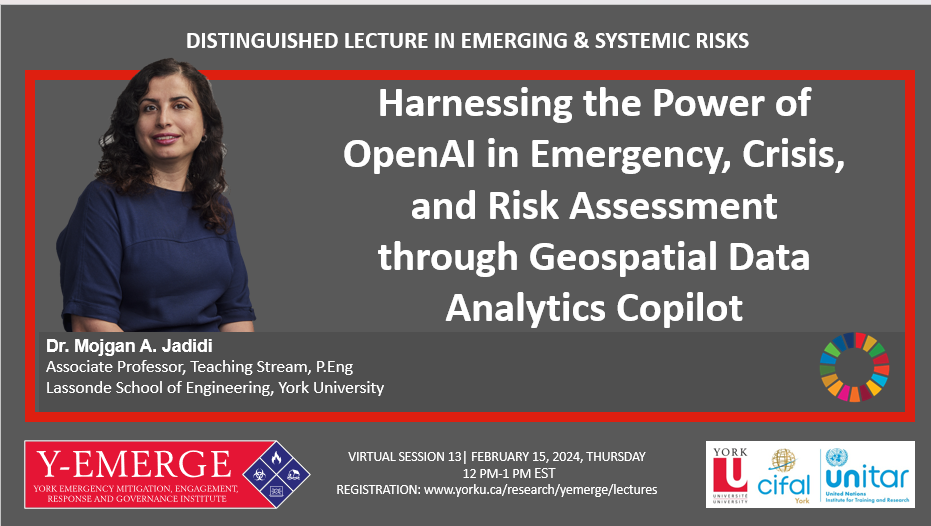
Harnessing the Power of OpenAI in Emergency, Crisis, and Risk Assessment through Geospatial Data Analytics Copilot
Dr. Mojgan A. Jadidi
Associate Professor, Lassonde School of Engineering, York University
VIRTUAL , THURSDAY FEBRUARY 15, 2024, 12PM-1PM EST
Lecture 12
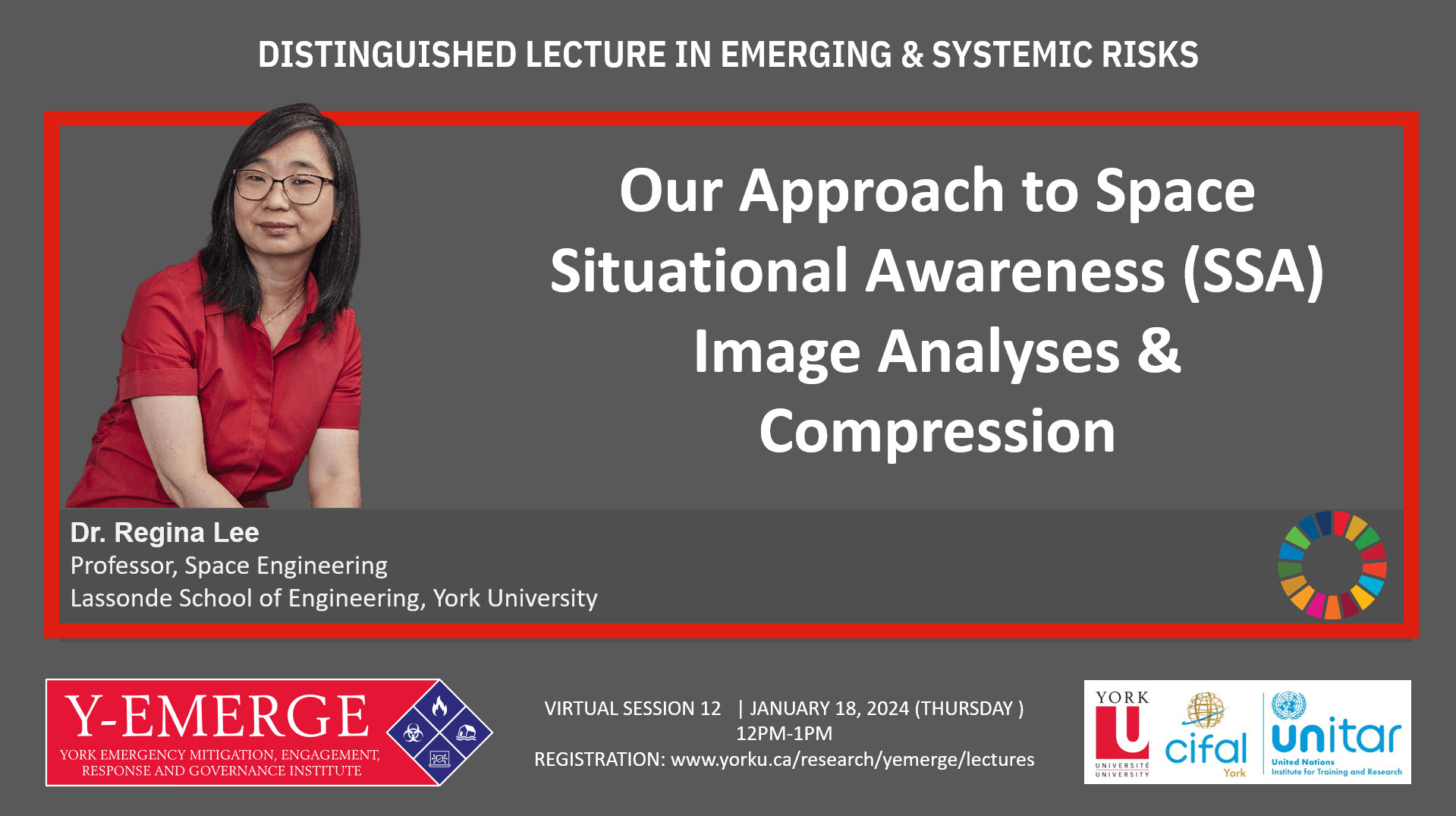
Our Approach to Space Situational Awareness (SSA): Image Analyses & Compression
Dr. Regina Lee
Professor, Space Engineering, Lassonde School of Engineering, York University
VIRTUAL , THURSDAY JANUARY 18, 2024, 12PM-1PM EST
Lecture 11

Emerging Pedestrian Safety Risks
Pioneering Tactical Urban Planning and Sidewalk Robot-Pedestrian Simulations
Dr. Gunho Sohn
Chair and Associate Professor, Department of Earth and Space Science and Engineering
Inaugural Director of Mobility Innovation Centre (MOVE)
VIRTUAL , THURSDAY NOVEMBER 16, 2023, 12PM-1PM EST
Lecture 10
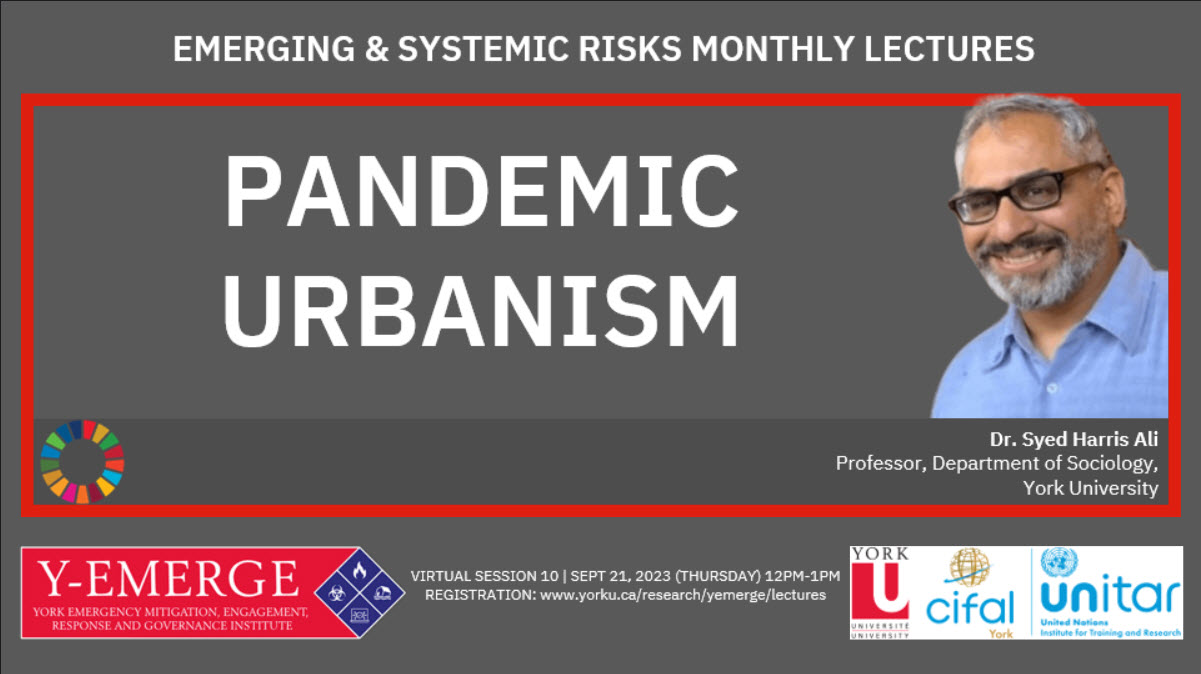
Pandemic Urbanism
Dr. Harris Ali
Professor, Department of Sociology, York University
VIRTUAL , THURSDAY September 21, 2023, 12PM-1PM EST
Lecture 9
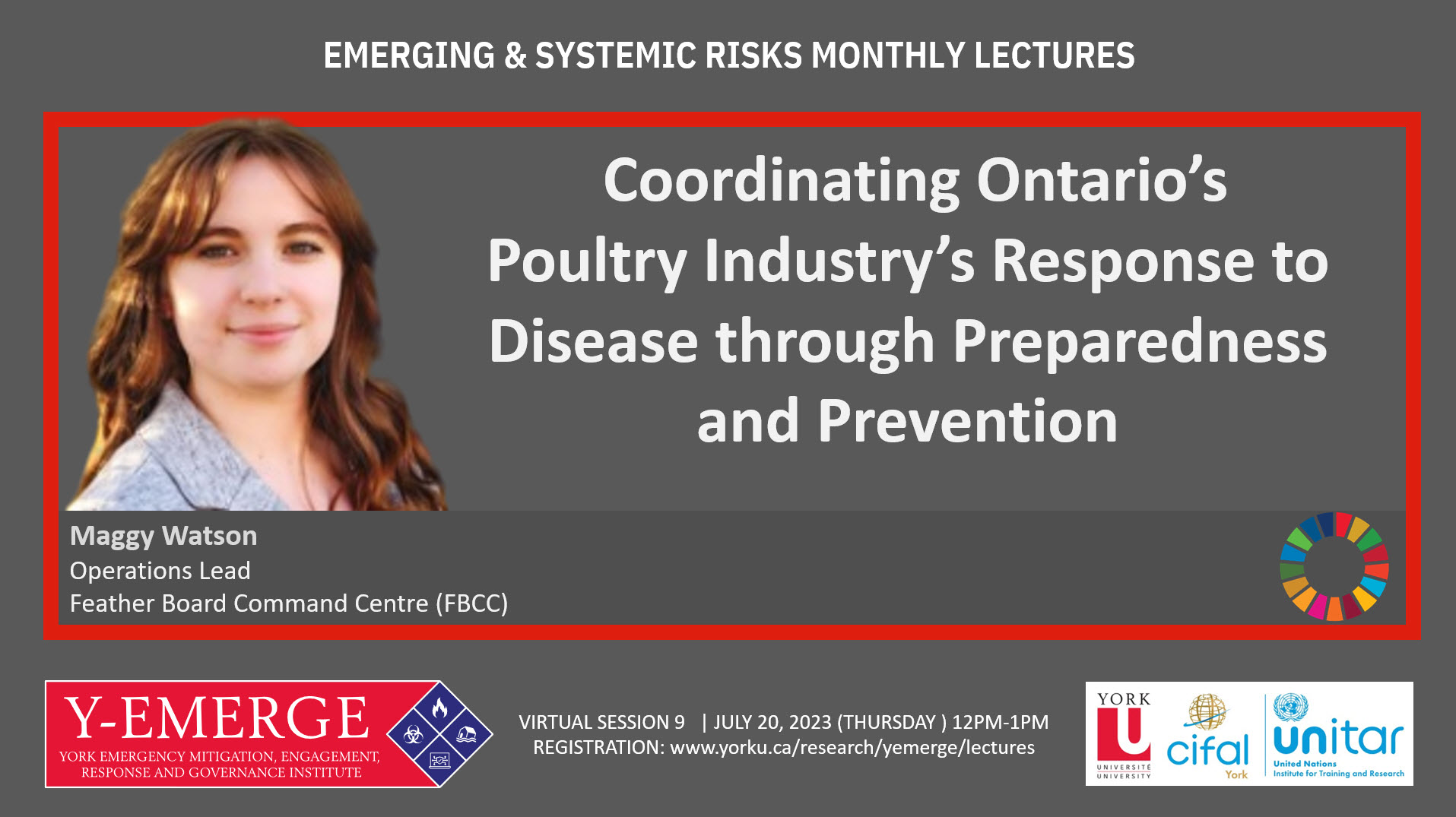
Coordinating Ontario’s Poultry Industry’s Response to Disease through Preparedness and Prevention
Maggy Watson
Operations Lead at the Feather Board Command Centre (FBCC)
VIRTUAL , THURSDAY JULY 20, 2023, 12PM-1PM EST
Lecture 8
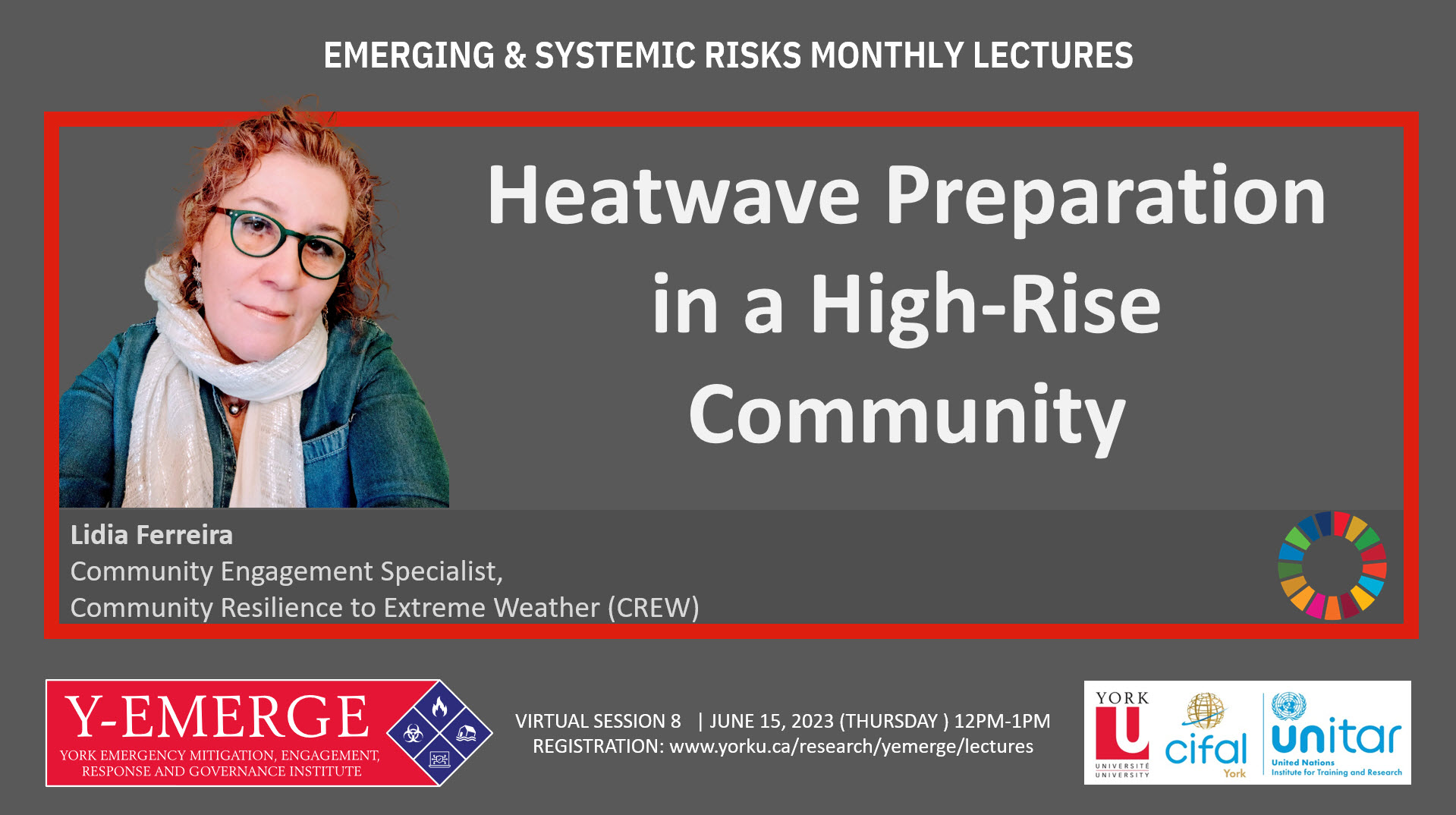
Heatwave Preparation in a High-Rise Community
Lidia Ferreira
Community Engagement Specialist, Community Resilience to Extreme Weather (CREW)
VIRTUAL , THURSDAY JUNE 15, 2023, 12PM-1PM EST
Lecture 7
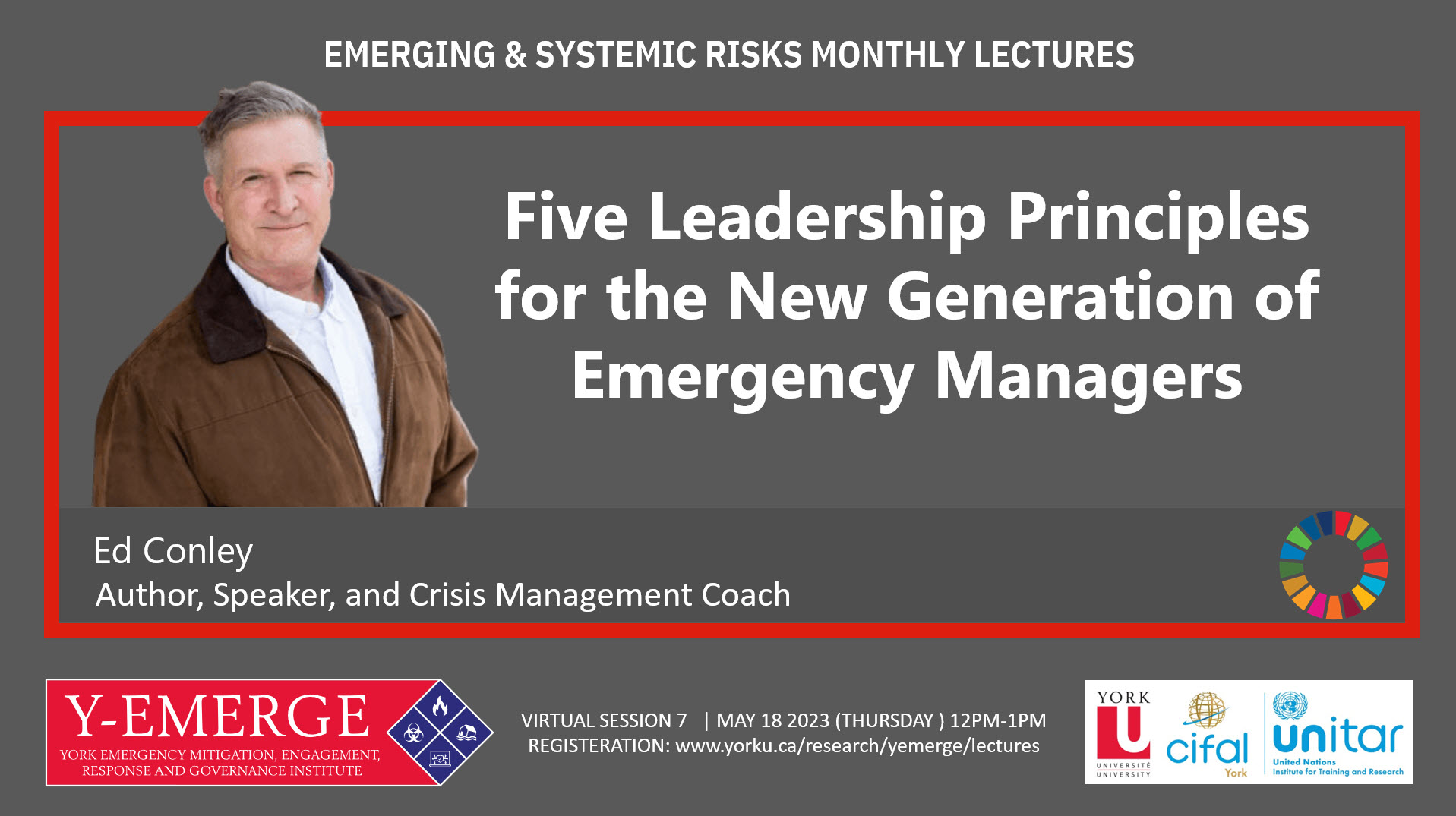
Five Leadership Principles for the New Generation of Emergency Managers
Ed Conley
Author, Speaker, and Crisis Management Coach
VIRTUAL , THURSDAY MAY 18, 2023, 12PM-1PM EST
Register
Lecture 6
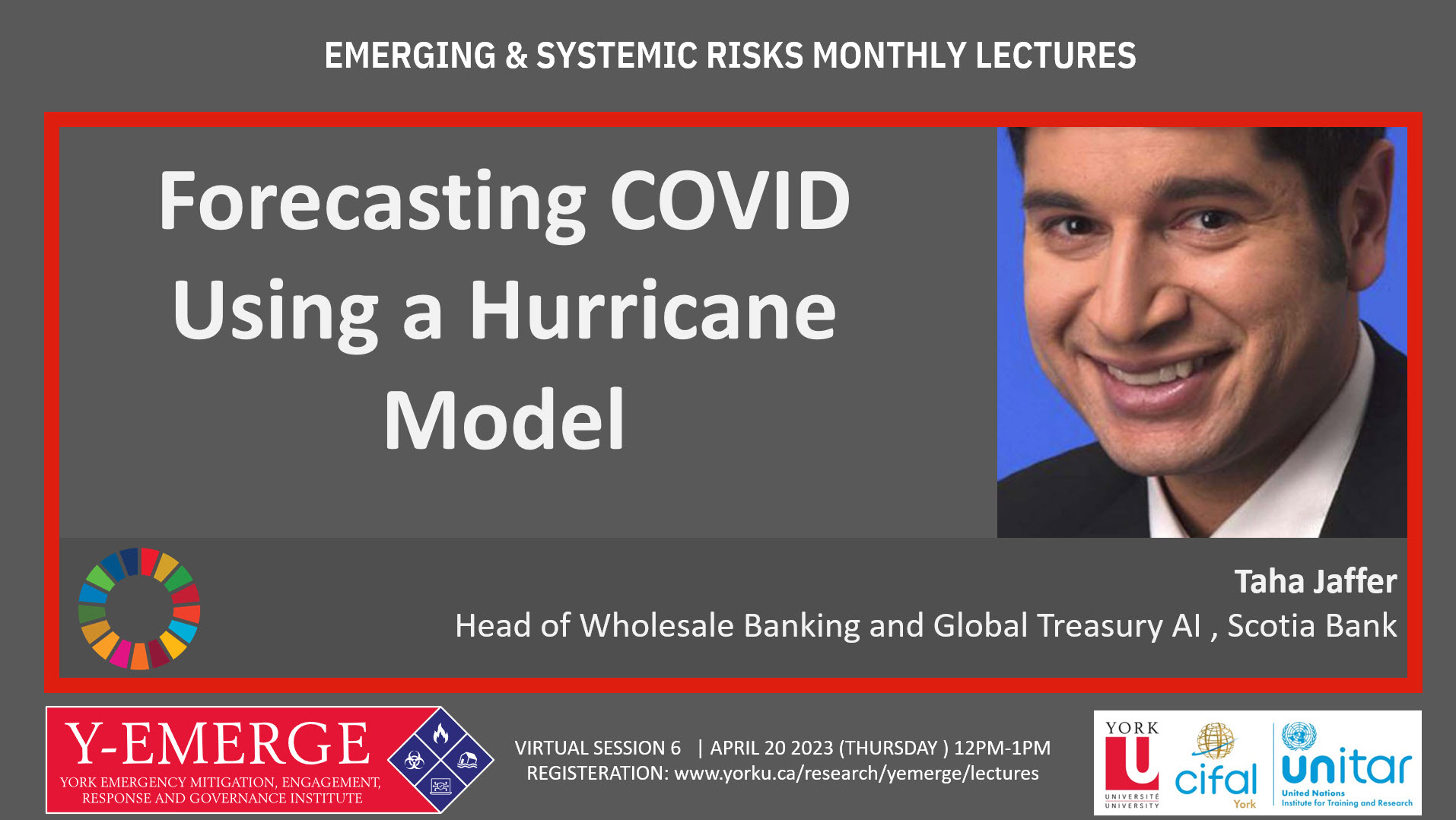
Forecasting COVID Using a Hurricane Model
Taha Jaffer
Head of Wholesale Banking and Global Treasury AI , Scotiabank
VIRTUAL , THURSDAY APRIL 20, 2023, 12PM-1PM EST
Recording of lecture 6
Lecture 5
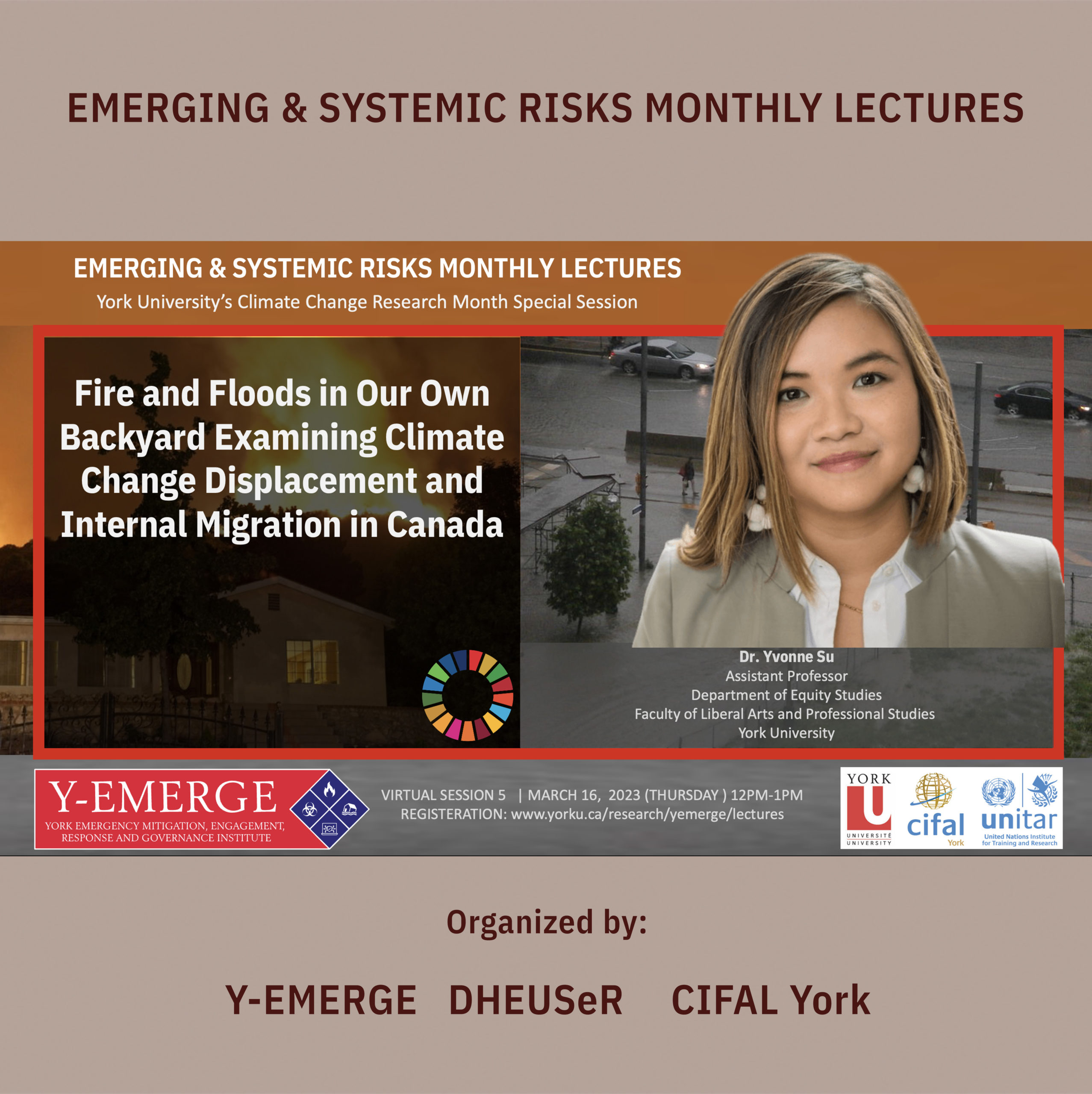
Fire and Floods in Our Own Backyard: Examining Climate Change Displacement and Internal Migration in Canada
Dr. Yvonne Su
Assistant Professor
Department of Equity Studies
Faculty of Liberal Arts and Professional Studies
York University
VIRTUAL , THURSDAY MARCH 16 12PM-1PM EST
Lecture 4
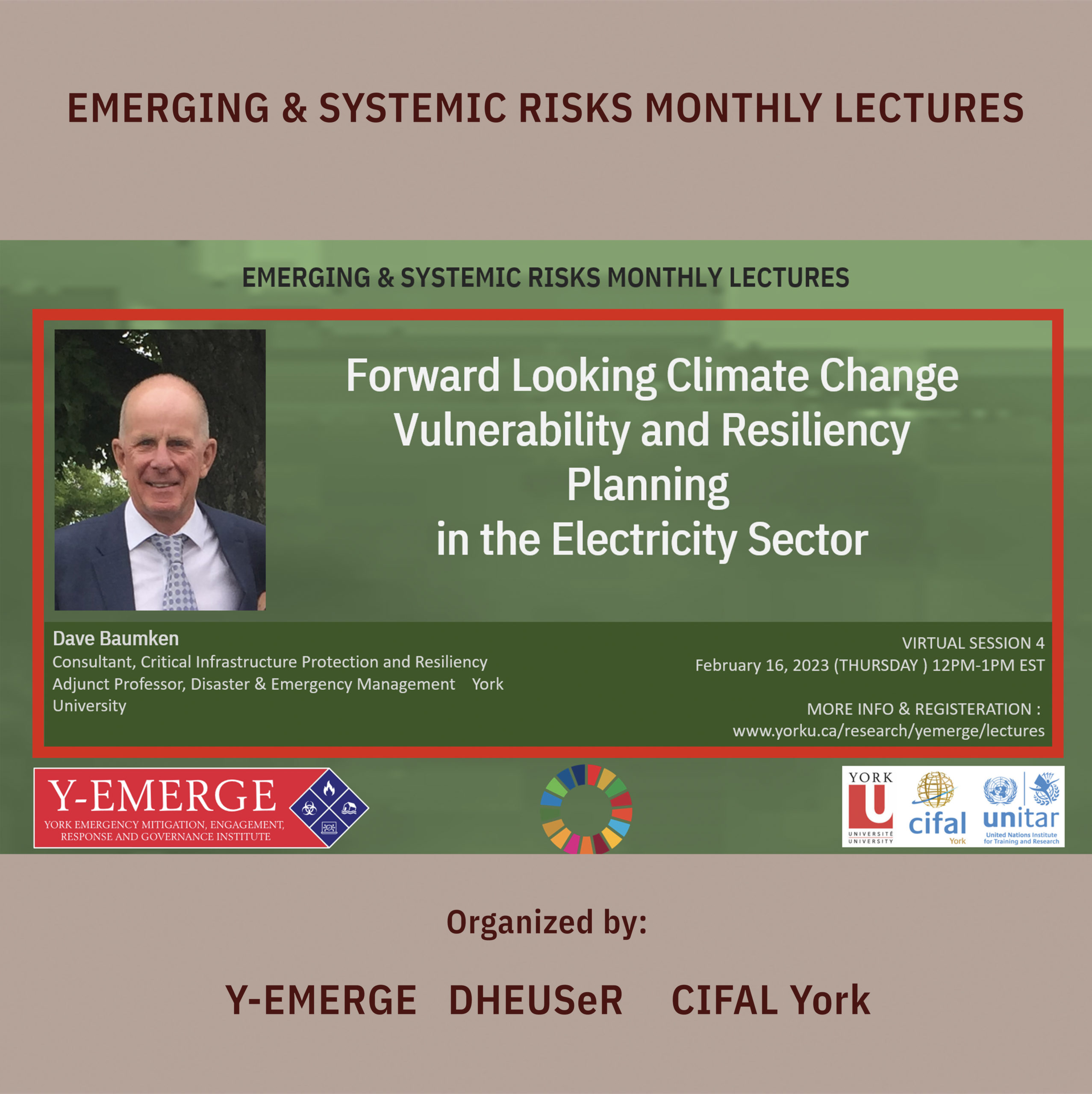
Forward Looking Climate Change Vulnerability and Resiliency Planning in the Electricity Sector
Dave Baumken
Consultant, Critical Infrastructure Protection and Resiliency
Adjunct Professor, Disaster & Emergency Management
York University
VIRTUAL , THURSDAY FEBRUARY 16 12PM-1PM EST
Lecture 3
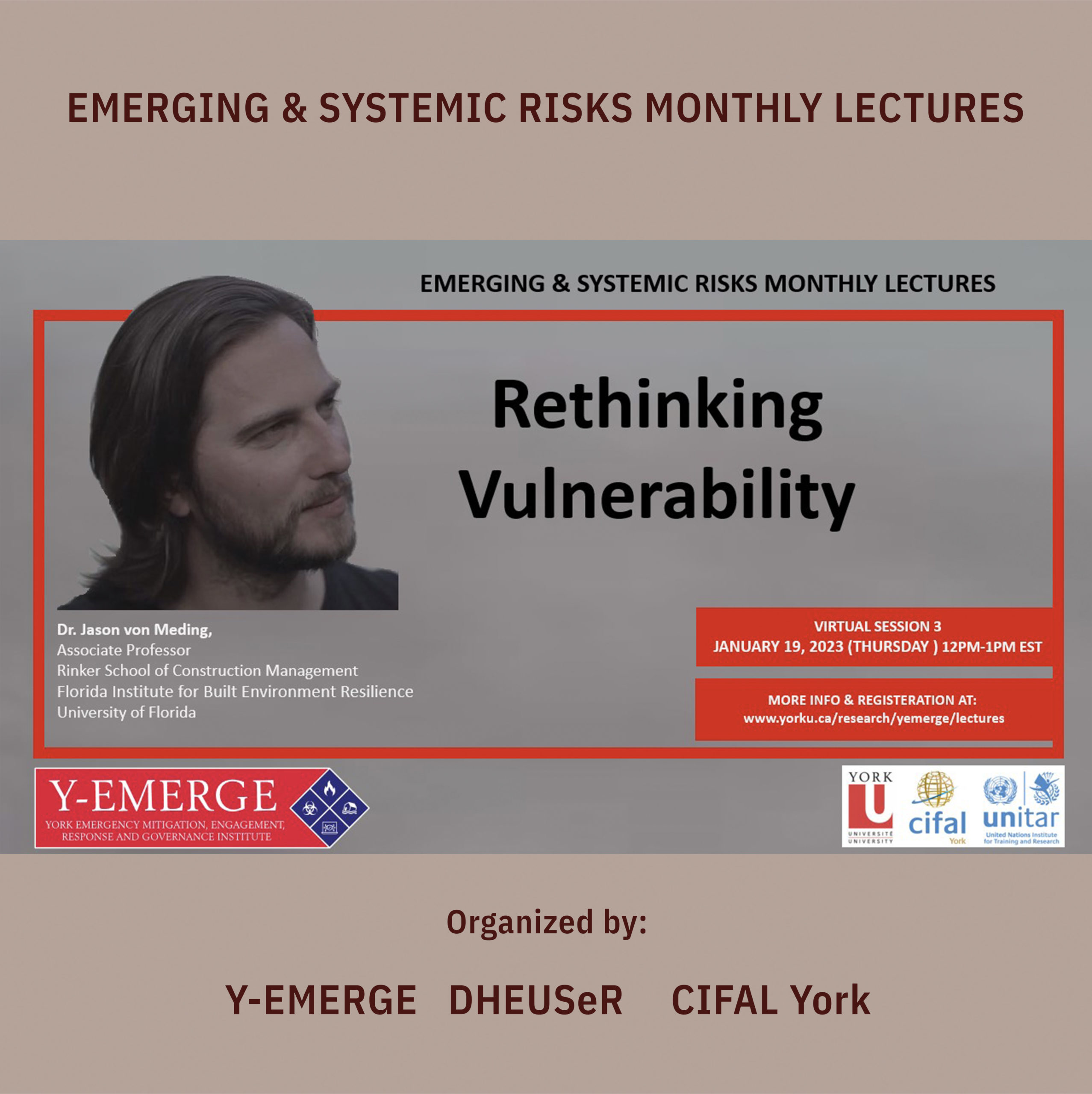
Rethinking Vulnerability
Dr. Jason von Meding, Associate Professor
Rinker School of Construction Management
Florida Institute for Built Environment Resilience
University of Florida
VIRTUAL , THURSDAY JANUARY 19, 12PM-1PM EST
Lecture 2
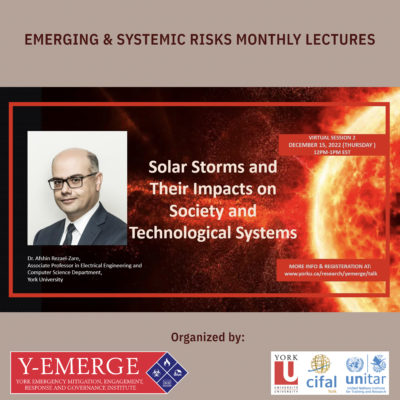
Solar Storms and Their Impacts on Society and Technological Systems
Dr. Afshin Rezaei-Zare, Associate Professor
Electric Engineering and Computer Science, Department
York University
VIRTUAL , THURSDAY DECEMBER 15, 12PM-1PM EST
Lecture 1
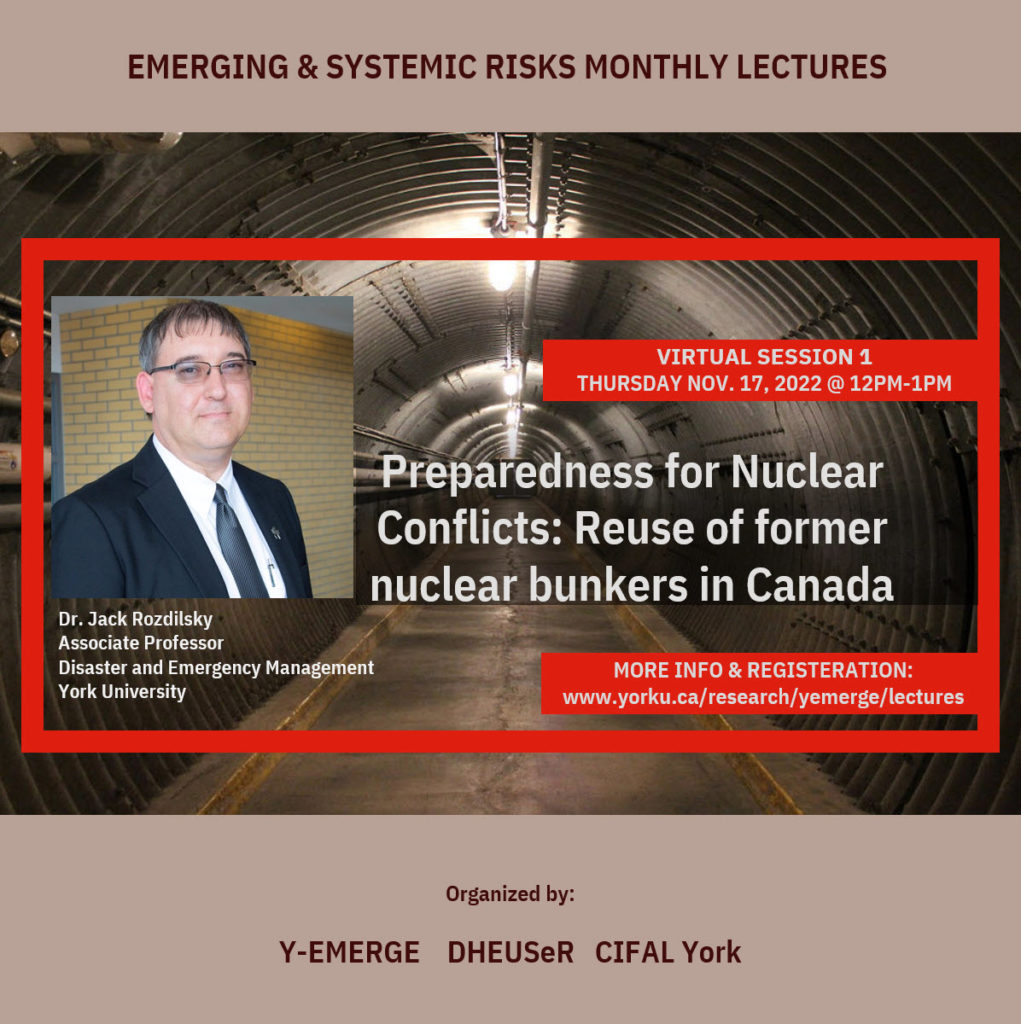
Preparedness for Nuclear Conflicts: Reuse of former nuclear bunkers in Canada
Dr. Jack Rozdilski, Associate Professor
Disaster and Emergency Management
School of Administrative Studies
Faculty of Liberal Arts & Professional Studies
York University
VIRTUAL , THURSDAY NOVEMBER 17, 12PM-1PM
